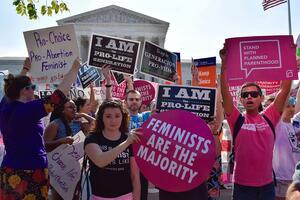L’chaim: A Pro-Choice Narrative
The summer of 2015, rising seventh grade me went off to sleepaway camp with an abstract sense of Malala/Emma Watson-based feminism, and a hunger to learn more. My junior counselor that summer provided the outlet I craved. She taught me multiple phrases to add to my growing feminist lexicon (“girls just want to have FUNDAMENTAL HUMAN RIGHTS,” and “that’s so heteronormative”), and I understood most of them pretty clearly within my eleven-year-old worldview. However, I distinctly remember my confusion over a pin on her backpack that read, “Keep your theology off my biology.” When I asked what it meant, she converted it to simpler words—“keep your religion out of my body,” but I still didn’t quite understand.
Since that summer, my Malala/Emma Watson-based feminism has morphed into a much more intersectional feminist identity, and my feminist vocabulary has grown with that transformation. I learned about abortions and the so-called “pro-life” crusade, and decided very quickly that I was pro-choice. I forgot about the pin and most of the catchphrases I had learned that summer, and moved on with my broadened feminist worldview.
Now, in the wake of multiple states’ legislatures pushing for abortion bans, I was reminded of my counselor’s pin. As someone with a developed understanding of the separation of church and state, as well as the government’s role in controlling women’s bodies, I was understandably furious. But as I looked at the mostly male, mostly white, mostly Christian faces of the people peddling these oppressive bills, I wondered what Judaism had to say about it.
Recently I was gifted The Book of Jewish Values, and as I flipped through the pages I spotted a section on abortion titled “Is Abortion Murder? Should A Woman’s Right to an Abortion be Absolute?” to which I silently responded “no,” and, “yes,” respectively.
The book had a slightly different view. The answer to the first question, “Is Abortion Murder?” was the same as mine— a resounding no. In Jewish tradition, a fetus is considered a part of the person carrying it, and only attains an individual identity at birth. Halachically, the punishment for someone injuring a fetus inside the womb is merely a monetary fine, instead of the much harsher punishment prescribed for murder (Telushkin 258).
However, the answer to “Should A Woman’s Right to an Abortion be Absolute?” differed from my immediate yes. According to the book, a woman’s right to abortion is not absolute, but is acceptable in certain cases. In the circumstance that the health or wellbeing of the pregnant person is at serious risk, the fetus may be aborted, as their “life takes precedence over that of the fetus” (Mishnah Ohalot 7:6). The emphasis in this situation is that it was warranted by “serious” circumstances— but “serious” is very subjective, as what one person deems serious can be very different from someone else’s perception of the situation.
For example, in Donald Trump’s opinion, only three situations count as serious enough to warrant an abortion: rape, incest, and threat to the life of the mother. I strongly disagree with him. First, I think any negative implications on a person’s life can potentially be considered serious. Any emotional, physical, and financial implications are worth fully exploring in order to make the decision that is best for the pregnant person and the fetus. Second, I believe that anyone with a womb should unequivocally have the right to an abortion. Period.
Lives should be protected and empowered, but the focus should not be on unborn, undeveloped fetuses. It should be on the people in the world today, the kids in foster-care systems, the incarcerated, those who are experiencing homelessness or any other struggle.
Despite my disagreement with traditional Jewish law in this case, my Judaism still runs deep. One of the most important values that Judaism has taught me is critical questioning, and now I’m employing that skill to protect and uplift myself and all others who are affected by these ridiculous new laws.
L'chaim
This piece was written as part of JWA’s Rising Voices Fellowship.







